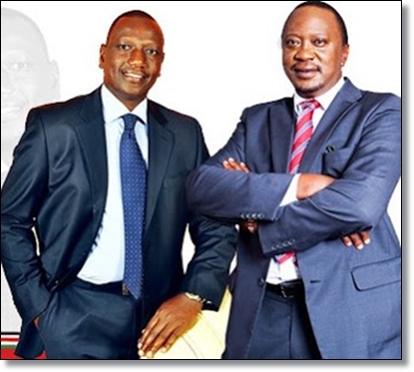Elections 2013: Kenya on Right Path

 |
| The President-Elect with his Deputy |
Importantly, though, Kenyans shied away from butchering one another. This is what makes the difference in the just concluded elections and those of 2007. Following what happened during the 2007-8 Post Election Violence, the whole world was a bit wary when Kenyans went to polls. All eyes were on Kenya. Kenyans however proved that they can bury violence despite the fact that tribalism and ethnicity still looms over their heads.
The peaceful voting is attributable to the stance that the people of Kenya, the media and the three arms of the state (especially the executive and the judiciary) took. If anything, the common wananchi were calm, hopeful and resilient. Methinks they believed in Kenya more than anything—Kenya is a name; the nation is you. I loved this slogan so to speak. It energized and sensitized the people and gave them courage and new understanding of who they are and what is expected of them.
I heard some politicians, even analysts referring to Tanzania as an ideal example. Again, Tanzania is made of common bin-Adams like those found in Kenya. In this regard, the difference, however, is that the founding father of the nation invested heavily on what people see and refer to.
The government, in Tanzania, introduced mandatory Jeshi la Kujenga Taifa (JKT) or National service. This brought all educated youths from all over the country together to share their experience, expertise and dreams. This had motivation attached to it. Nobody would be admitted to university without doing national service. All academics had to go through national initiation aimed at making them think in terms of the nation but not ethic group or region. Again, coupled with obtaining secondary school education in the same style--- that nobody would study in his or her area--- the dividends were high. True, this contributed a lot to intermarriage especially for academicians. Many of my friends (including myself) married spouses we met either in secondary school or JKT, if not at work.
So too, appointments to any public service went in line with national policy and identity. They were done with cognizance of the national agenda-cum-policy. All appointments strictly revolved around national building instead of tribe. For instance, nobody would serve in his or her home area unless otherwise recommended.
My experience in Kenya showed the difference I had compared to my hosts especially those who had nary ventured out of Kenya. I found full-suit marriage as we call it back home to mean marrying from the same ethnic society. By the way, Tanzania has over 120 ethnic groups.
Monoculture and linear thinking is the first thing I encountered when I started living in Kenya. I could clearly sense this in my casual discussions with various educated friends. I also could notice a difference when I was talking to people like Willy Mutunga or Makau Mutua who would sound more internationally than tribally. I remember one incident at KHCR where one woman named Wanjiku said that she would not vote for a non-kikuyu. When I asked her why, she just simply said, “A non-Kikuyu can’t get my vote.” It means she had no logical reason but just tribal sentiments.
In a nutshell, wherever there is political willingness and readiness, all is possible as Kenya has just proved. Given that Kenya has taken a step towards nationalism as opposed to tribalism, let the new government do more in this regard. The founder of Tanzania, Mwalimu Julius Nyerere, was able to make Tanzania what it is (case study) through putting in place things such as policy, vision and motivation. This is why Tanzanians are always regarded as ndugu. Our vector has always been equality, fraternity, continuity, prosperity and solidarity. However, things are slowly changing and we are not happy with it. We are doing whatever it takes to see to it that we remain more nationalistic than tribal oriented.
Again, Kenya has proved that it can shy away from oddity uppity and ethnicity to nationality and equality, and unity and freedom (Usawa, Uhuru na Umoja). Let the just concluded elections act as a niche with which to start building national sentiments.
Now that the dust has already settled, my prayer is that the IDPs be settled so that they can live just like other Kenyans.
By Nkwazi Mhango
The author is a Canada-based Tanzanian and author of Saa Ya Ukombozi.
